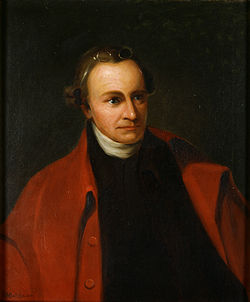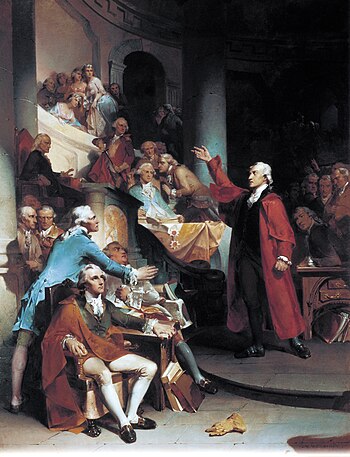This is an old revision of this page, as edited by 151.188.0.231 (talk) at 18:37, 14 March 2006 (→Quotations). The present address (URL) is a permanent link to this revision, which may differ significantly from the current revision.
Revision as of 18:37, 14 March 2006 by 151.188.0.231 (talk) (→Quotations)(diff) ← Previous revision | Latest revision (diff) | Newer revision → (diff) For other people with this name, see Patrick Henry (disambiguation). | |
| Order: | 1st VA Governor 6th VA Governor |
|---|---|
| Term of Office: | 1776—1779 1784—1786 |
| Followed: | (none) Benjamin Harrison V |
| Succeeded by: | Thomas Jefferson Edmund Randolph |
Patrick Henry (May 29, 1736 – June 6, 1799) was a prominent figure in the American Revolution, known and remembered primarily for his stirring oratory. Along with Samuel Adams and Thomas Paine, he was one of the most influential (and radical) advocates of the American Revolution.
Biography
The picture of Henry by Peter F. Rothermel shows Henry throwing down his gauntlet or glove, which is a traditional sign for a fight. Trained as an attorney, and noted for his heated oratorical skills, this Virginian first made a name for himself in a case dubbed the "Parson's Cause" (1763) which was an argument on whether the price of tobacco paid to clergy for their services should be set by the colonial government or by the Crown. Henry lost the case in actuality, but damages were set at such a nominally low level that the result was widely perceived to be a victory for the independence movement, to the consternation of the British government. Perhaps in part because of his success in this venture, Henry was elected to the House of Burgesses (the legislative body of the Virginia colony) in 1765. That same year, he proposed the Virginia Stamp Act Resolutions. The freshman representative waited for an opportunity where the mostly conservative members of the House were away (only 24% was considered sufficient for a quorum). In this atmosphere, he succeeded, through much debate and persuasion, in getting his proposal passed. It was possibly the most anti-British (many called it "treasonous") American political action to that point, and some credit the Resolutions with being one of the main catalysts of the Revolution. The proposals were based on principles that were well established British rights, such as the right to be taxed by one's own representatives. They went further, however, to assert that the colonial assemblies had the exclusive right to impose taxes on the colonies and could not assign that right. The imputation of treason is due to his inflammatory words, "Caesar had his Brutus; Charles the First his Cromwell; and George the Third—" "George the Third may profit by their example. If this be treason, make the most of it."

According to biographer Richard Beeman, the legend of this speech grew more dramatic over the years. Henry probably did not say the famous last line of the above quote, i.e. "If this be treason, make the most of it." The only account of the speech written down at the time by an eyewitness (which came to light many years later) records that Henry actually apologized after being accused of uttering treasonable words, assuring the House that he was still loyal to the king. Nevertheless, Henry's passionate, radical speech caused quite a stir at the time, even if we cannot be certain of his exact words.
Henry is perhaps best known for the speech he made in the House of Burgesses on March 23, 1775, urging that legislature to take military action against the encroaching British military force. The House was deeply divided, but was very much leaning toward not committing troops. As Henry stood in Saint John's Church in Richmond, Virginia, he ended his speech with his most famous words;
- Is life so dear, or peace so sweet, as to be purchased at the price of chains and slavery? Forbid it, Almighty God! I know not what course others may take; but as for me, give me liberty or give me death!
The crowd jumped up and shouted "To Arms! To Arms!". This speech is credited by some with single-handedly delivering the Virginia troops to the Revolutionary War. Problematically, the text of this speech did not appear in print until 1817, in the biography Life and Character of Patrick Henry by William Wirt. Although Wirt assembled his book from recollections by persons close to the events, some historians have since speculated that the speech, or at least the form with which we are familiar, was essentially written by Wirt decades after the fact.
Early in the Revolutionary War, Henry led militia against Royal Governor Lord Dunmore in defense of some disputed gunpowder, an event known as the Gunpowder Incident. During the war, he served as the first post-colonial Governor of Virginia, from 1776-79, an office he held again from 1784-86.
After the Revolution, Henry was an outspoken critic of the United States Constitution and urged against its adoption, arguing it gave the federal government too much power. As a leading Antifederalist, he was instrumental in the adoption of the Bill of Rights to amend the new Constitution.
In the later years of his life, Henry was a key figure in a major land speculation scandal involving the Yazoo lands in what was then the western territory of Georgia.
He died at Red Hill Plantation, Virginia, in 1799 at the age of 63.
Monuments and memorials
The United States Navy submarine USS Patrick Henry (SSBN-599) and the CSS Patrick Henry of the Confederate Navy were named in his honor, as was the first WWII Liberty ship, the SS Patrick Henry. Patrick Henry High School in Ashland, Virginia and Patrick Henry College in Purcellville, VA are also named in his honor.
Places named in honor of Patrick Henry include:
- Henry County, Alabama
- Henry County, Georgia
- Henry County, Illinois
- Henry County, Tennessee
- Henry County, Virginia
- Patrick County, Virginia
Quotations
- "aesar had his Brutus, Charles the First his Cromwell and George the Third..."
- "Treason!" cried the Speaker.
- "...may profit by their example. If this be treason, make the most of it."
- May 30, 1765 Speech before the Virginia House of Burgesses
- "United we stand, divided we fall. Let us not split into factions which must destroy that union upon which our existence hangs." — from a speech given shortly before his death
- "An appeal to arms and the God of hosts is all that is left us. But we shall not fight our battle alone. There is a just God that presides over the destinies of nations. The battle sir, is not of the strong alone."
- "Gentlemen may cry, peace, peace -- but there is no peace. The war is actually begun! The next gale that sweeps from the north will bring to our ears the clash of resounding arms! Our brethren are already in the field! Why stand we here idle? What is it that gentlemen wish? What would they have? Is life so dear, or peace so sweet, as to be purchased at the price of chains and slavery? Forbid it, Almighty God! -- I know not what course others may take; but as for me, give me liberty or give me death!"
- March 23, 1775 Speech before the Virgina House of Burgesses
- "Suspicion is a Virtue if it is in the interests of the good of the people"
- "Taxation without representation is tyranny."
- "This is all the inheritance I can give my dear family. The religion of Christ can give them one which will make them rich indeed."
- The Last Will and Testament of Patrick Henry
- “It cannot be emphasized too clearly and too often that this nation was founded, not by religionists, but by Christians; not on religion, but on the gospel of Jesus Christ. For this very reason, peoples of other faiths have been afforded asylum, prosperity, and freedom of worship here.”
- “The Bible is worth all other books which have ever been printed.”
References
- Beeman, Richard R. Patrick Henry: A Biography. New York: McGraw-Hill, 1974. ISBN 0070042802.
- Raphael, Ray. Founding Myths: Stories that Hide our Patriotic Past. New York: New Press, 2004. ISBN 1565849213.
- ———. "Are U.S. History Textbooks Still Full of Lies and Half-Truths?" (online essay)
See also
External links
- Works by Patrick Henry at Project Gutenberg
- Hanover County, Virginia, birthplace of Patrick Henry and location of the Hanover Tavern, where Henry lived and worked early in his life, and Hanover Courthouse, where the Parson's Cause case was argued in 1763.
- Scotchtown Plantation, Henry family home from 1771 - 1778 ,
- St. John's Church (Richmond, Virginia), where Henry delivered "Liberty or death" speech in 1775
- Text of 1775 "Liberty or death" speech
- Red Hill Plantation (Charlotte County, Virginia), Henry's final home and burial place
- Address opposing US Constitution
| Preceded byEdmund Pendleton^ | Governor of Virginia 1776–1779 |
Succeeded byThomas Jefferson |
| Preceded byBenjamin Harrison V | Governor of Virginia 1784–1786 |
Succeeded byEdmund Randolph |
- ^ Pendleton was President of the Committee of Safety which had power after the colonial governor fled